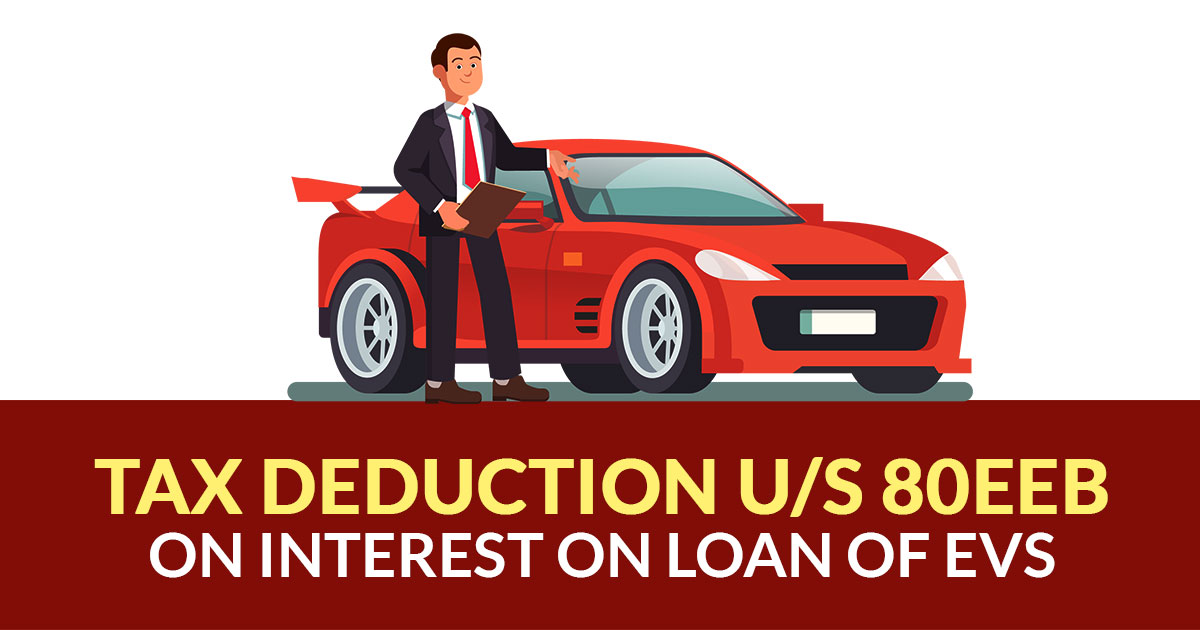
The government of India has declared in the union budget for 2019 an incentive to buy electric vehicles (EVs). Inside the budget, the finance minister has specified that the advanced battery and the enrolled EVs shall be motivated by the policy. The latest section 80EEB of the Income Tax Act 1961 has started which permits the tax deduction for the interest furnished on loans obtained for the buying of the EVs under section 80EEB from the assessment year 2020-21.
What is Income Tax Section 80EEB?
The deduction towards the interest furnished on the loan opted via buying the electric vehicle is opened beneath section 80EEB of the Income Tax Act 1961 which is mentioned through the Finance Act 2019. The deduction is available to increase the buying of EVs all across the country. The tax advantages upon the buying of electric vehicles. To be entitled to avail of the tax advantages mentioned are the conditions to get furnished.
Eligibility Criteria for EV Under Section 80EEB
The deduction beneath the same section is available to only one person. The same deduction is not available to any additional assessee. Hence when you have a HUF, AOP, Partnership firm, a company, or any additional sort of assessee then you cannot avail any advantage beneath this section.
Major Benefits of Purchasing EVs As Per Section 80EEB
- The loan must be opted from the bank or mentioned NBFC
- The loan needs to be sanctioned between 01/04/2019 and 31/03/2023.
- The deduction will not be more than Rs 1.5 lakh.
- Loan availed to buy the electric vehicle
- As a deduction, the interest portion of the loan is to be permitted.
- Only the person can avail of the deduction beneath the section.
Note: The same deduction gets permitted to the personal assessee only. But when the person is executing the business proprietorship firm and a vehicle is practised for the business usage, he or she can avail the same as an expense of the business in their account whatever the amount. The vehicle needs to be enrolled in the owner’s name or in the business name. Towards the concern, 1.5 lakh shall not be subjected to apply since the individual is formally claiming it as a business expense and one shall not avail that expense twice.
Read Also: Section-Based Income Tax-Saving Tips For Salaried Person
Other Benefits of Purchasing the Electric Vehicles
- No road tax is imposed on electric vehicles and the cost of registration in some of the states such as Delhi draws the lesser expense.
- Only a 5% rate is applied as low GST which before was 12%.
- Exemption from the green tax on personal vehicles will be imposed with the tax when the RC gets renewed post to 15 years. Electric vehicles shall get privileged from the green tax.
- When there is no fuel then there will be no emission and poses lower maintenance as it is an older combustion engine and poses various moving parts that consist of more wear and tear which the electric motor poses less than 20.
Deduction Claiming Conditions for Electric Vehicle
The loan should be opted via a financial institution or a non-banking financial firm to purchase the electric vehicle.
From the duration between 1 April 2019 and 31 March 2023, the loan should be sanctioned anytime.
“Electric vehicle” has been described to mean a vehicle that runs from an electric motor whose traction energy is supplied only by the traction battery installed inside the vehicle and it also has an electric regenerative braking system which on braking gives the conversion of the vehicle kinetic energy into electrical energy.
Advertising of Electric Vehicle Mobility Solution
The union cabinet has given a green signal to Phase II of the FAME scheme for the promotion of electric mobility in the country. The FAME (Faster Adoption and Manufacturing of Electric Vehicles) is an incentive scheme of the government of India for the promotion of electric and hybrid vehicles in the country.
The only purpose of the scheme is to promote electric mobility and the scheme offers financial incentives to buy electric vehicles along with the making of the electric transportation and charging infrastructure.
Beneath the policy, the incentives are there for 3-wheelers, 4-wheelers, and electric 2-wheelers. Phase II of the scheme will begin on 1 April 2019 and will be finished by 31 March 2022. “Phase II is an extended version of the first phase. FAME India Phase II has a total outlay of Rs 10000 Crores over 3 years from 1 April 2019 to 31 March 2022.”









